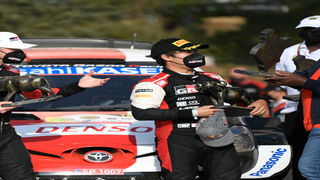
Japanese driver Takamoto Katsuta (centre) and British co-driver Daniel Barritt (left) receive their trophies from Kenyan President Uhuru Kenyatta (right) on the podium after placing second in the 2021 Safari Rally Kenya near Hell’s Gate at Lake Naivasha, Kenya, on June 27, 2021.
Motorsport
Premium
It’s official, Safari Rally will be back again, and again
What you need to know:
- Many also doubted Kenya’s capability to organise a competition meeting present-day WRC standards until yesterday when all concluded that the country produced a sleek event courtesy of the President, government and the organising committee of volunteers.
When the Kenyan Government signed an event agreement with the WRC Promoter in 2018 to host the Africa Championship Safari Rally the following year, many were still skeptical that this would be a tall order, and if the Safari ever returned to the FIA World Rally Championship (WRC), it might be a one-off.
But on Sunday, President Uhuru Kenyatta gifted Kenyans with the very good news that the Safari Rally is guaranteed a slot in the high profile FIA (International Automobile Federation) World Rally Championship (WRC) after consultation with the FIA and the WRC Promoter — the commercial rights holder of the annual 13-rounds series until 2026 — only four years short of the Vision 2030 ambition which did not have a proper road map for sports.
In his speech at Sunday’s closing ceremony, President Kenyatta was elated that his Jubilee Government’s pre-election pledge to get the Safari Rally back onto the World Rally Championship had become a reality.
“Our efforts have paid off. We have staged a remarkable 2021 World Rally Championship Safari Rally, that has challenged both man and machine, and which will be remembered for many years to come,” the President said.
“Despite the prevailing Covid-19 challenges that have been felt by every country, the world has witnessed Kenya’s preparedness to stage and host world-class events, as well as our commitment, to maintain our position as one of the world’s top sporting destinations.
“It gives me great pleasure, therefore, to announce, that we have agreed, with the International Automobile Federation and the World Rally Championship, to continue hosting the Safari Rally in Kenya, every year until 2026.
“In this regard, my Administration will immediately start preparations for the next Safari Rally event, and I commit the required financial investment towards another successful championship in Kenya,” the President said among cheers from elated motorsports fans at the Kenya Wildlife Service Training Institute, the nerve centre of the week-long rally activities.
Produced a sleek event
Many also doubted Kenya’s capability to organise a competition meeting present-day WRC standards until yesterday when all concluded that the country produced a sleek event courtesy of the President, government and the organising committee of volunteers.
The 2021 WRC Safari Rally also re-affirmed its traditional reputation of being unforgiving, relentless, always having a sting in the tail end which snatched a possible victory from the jaws of Frenchman Thierry Neuville only 50 kilometres from the finish and broke the heart of Poland and their 91-years-old Sobieslow Zasada whose Ford Fiesta stalled just two kilometres from the finish before being hit by another competing car from the rear.
Instead, what appeared as a receding mirage turned out into exhilarating victory for Frenchman Sebastien Ogier, a confirmation of why he is seven times world champion, snatching valuable seconds on the final day to cancel a one minute 26 seconds deficit behind Neuville on Saturday, and end the day with a 21.8 second lead over Takamoto Katsuta, the young Japanese now considered a national hero who has replaced Kenjiro Shinozuka, a veteran WRC and Dakar Rally star of the 90s.
The Safari Rally zoomed off on Thursday outside the Kenyatta International Conference Centre and welcomed into Naivasha by a sizeable crowd.
A national treasure
Yesterday, this number tripled, cheers reaching a crescendo shortly after 2:00pm when Kenyan Onkar Rai, co-driven by Briton Drew Sturrock, entered the Kenya Wildlife Service Training Institute rally gate first in a revised order of arrivals.
The 33-year-old Onkar dedicated his R3 category victory to his brother Tejveer Rai who exited the Safari following a near-fatal roll on Friday.
The actual victors were the Kenyan people who followed the action through radio, newspapers and social media channels.
Tens of thousands either lined up the main roads or spectators’ stages in Naivasha and Soysambu.
Many endured cold, hunger, and traffic snarl-up last weekend when they either failed to secure accommodation, sleeping in their cars by the roadside or in the wild in readiness for the start of the action.
They contributed a lot to the Nakuru, Gilgil and Naivasha economy, the money trickling down to the common mwananchi.
The Safari also confirmed that sports is a healing therapy especially in these hard economic times, Covid-19 containment and politics. Strangers became friends of which for once Kenya has something they can claim as a national treasure.



